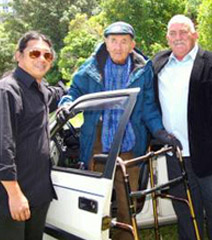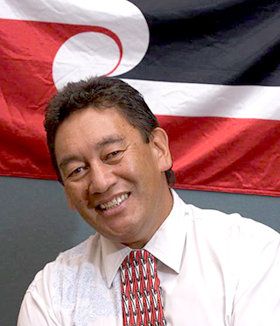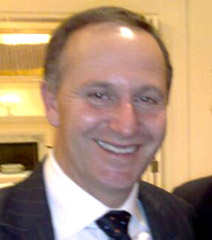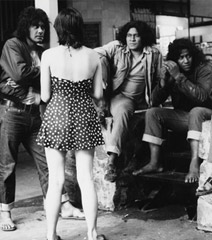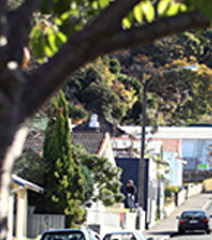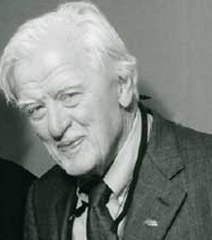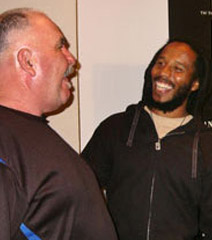Nga Kupu Aroha – Words of Love
1 December 2009
At year’s end Den tells of the extraordinary partnership between the Mongrel Mob Notorious and the Salvation Army in establishing a methamphetamine rehabilitation programme at Kakahi. He recounts the recent journey of the Mob and their arrival at the gates of the Citadel and how through courageous leadership on the part of Roy Dunne the Notorious chapter’s captain, pro-social change is afoot. Den describes the Consultancy Advocacy and Research Trust’s (CART) entry into its 20th year of community action and the opening of its new facility in Wellington by the Governor General His Excellency Sir Anand Satyanand. He says that the presence of the Governor General and senior officers of the New Zealand Police at this event, and the presence of Ngati Tuwharetoa paramount chief Tumu Te Heu Heu at Kakahi for the graduation for the Mongrel Mob families who completed the rehab programme, are in themselves profound demonstrations of leadership and antidotes to the language of hate currently being used by some politicians. Den outlines his plans for 2010, the Parihaka Peace Festival, Maori Motown (with a message), and the quest to get more meth rehab units up and running. He wishes readers blessings and hopes they get to hear and speak words of love each day of the New Year.
Nga Kupu Aroha – Words of Love
1 November 2009
Den reckons it's alright to be white in Aotearoa. He says he's comfortable in his skin as a card-carrying Pakeha, a member of Tangata Tiriti, and a paid up subscriber to the Treaty of Waitangi. He's a Kiwi, belongs here, and is subject to conservation and protection orders. He recalls past dealings with Hone Harawira but concludes that despite some frustrations with him Hone has an important role to play in our nation building. Den suggests that if he can't be included in Parliamentary politics he returns to the politics of the street and focuses on politicising the brown proloteriat. Responding to Winston Peters' challenge he could join the Maori gangs and lead them past their self defeating behaviours and Gonville lifestyles to become a new form of Nga Tamatoa. Following the death of Martyn Sanderson, Den reflects on this man's life and his use of theatre to resolve Black vs White conflicts and to right wrongs. He concludes "it's the putting white that counts".
Nga Kupu Aroha – Words of Love
1 October 2009
Denis clears his throat after a long winter, and proposes that our politics have been captured by populism masquerading as democracy. He reckons that we have seen racist laws at play in Whanganui, and that these express the lingering apprehensions of Anglo-settler society. Denis presents some upside down thinking around our prison system and recommends that if we are hell bent on privatisation why not consider Private Public Partnerships as a way forward. He says it's time to use some Kiwi nouse, smell the air of freedom, and sense the air of human potential and chance to develop productive partnerships. It's time to shut up on talkback. It's time to breathe through the nose.
Nga Kupu Aroha – Words of Love
1 July 2009
The D writes that it's what is recorded on the stub of our national cheque book that indicates the relative value we put on issues. In the area of criminal justice, despite the Government's stated commitment to 'top of the cliff' interventions rather than reliance on prison, "crush and crate 'em" is the flavour of the day. D praises the leadership of Dr Pita Sharples as Minister of Maori Affairs for getting 'buy in' from Maori street leaders towards a quest for peace on the streets of Aotearoa and for his advocacy of Maori learners getting access to tertiary education. There is korero about a possible spike in the availability of P, an account and reflection on the death and burial of Nomad's leader Denis "Mossie" Hines, and celebration at the graduation of Te Rangatira Jack Tuhi "Ranga" from Massey University.
(3,657 words)
Nga Kupu Aroha – Words of Love
1 May 2009
Napier has seen an awful tragedy unfold, and Den reflects on these events and salutes his local Maori copper Len Snee. Den argues that it's time for quiet support and reflection; to give space to the grieving, respect to the dead, and prayers for the injured.
(1,830 words)
Nga Kupu Aroha – Words of Love
1 April 2009
"The poet and creative genius Alan Brunton once described Dr Ian Prior as having 'blood dangerous with utopias'. Ian has died and left us, grieving, yet still propelled by his legacy of action into continued efforts towards social justice. Den tells the story of Sandeep Chawla, Director of the Division for Policy Analysis and Public Affairs of the United Nations Office of Drugs and Crime who, after a robust discussion with NZ gang members and drug dealers and users, suggests that one way for them to avoid disproportionate attention from the Police and media might simply to be a "little less annoying". Another St Patricks Day Hui & Huilli has gone off with great effect and a sense of locus for those who visited the ancient pa site, Otatara. There is praise for the continuing efforts of Maori Affairs Minister Pita Sharples who is out engaging Maori gang leaders and encouraging them to lead their crews away from criminality and anti-social behaviours and move towards a lifestyle built on a sense of identity as Maori, as whanau, and as members of community. Den gets the chance to talk to benches of judges and shares O'Reilly's lore: " Focus on the good", "Assume the best", "You'll see it when you believe it".
(4,108 words)
Nga Kupu Aroha – Words of Love
1 February 2009
It’s a new year and D is right into work. A bit of feedback about the Parihaka Peace Festival, engaging festival goers as participants rather than passive audiences, and bridging the cultural divide between Tangata Whenua and Tangata Tiriti. Den discusses the tragedy around Halatau Naitoko, a young Tongan father, accidentally shot dead by the Police. He commends the Minister and Commissioner for their restorative approach and encourages the gunman to face the Naitoko family and unload his burden. Den sticks up for Social Development Minister Paula Bennett who supported the gang member father of her granddaughter when he was before the Courts. Den reckons she has modelled good whanau leadership, and improved the chances both of a rehabilitated offender, and of loving, respectful relationships between the daughter, granddaughter, and father. Te Ururoa Flavell, stung by the tragic events in Murupara, has voiced his pain, saying that perhaps gang members shouldn’t be allowed on marae, or shouldn’t be gifted the tradition of tangihana. Den reckons that with leadership from within gangs and from within the body politic New Zealand Maori gangism can pass, and be replaced by a widely shared positive focus on personal achievement within a whanau hapu tribal complex. With Ragamuffin coming up, and the Marley whanau in town, Den reminisces about what happened after Bob’s visit to Aotearoa in 1979 and tells the tale of the Keskidee Aroha project, the rise of aggressive black consciousness, and the whakapapa of reggae and Rasta in Aotearoa. Waitangi Day or Bob Marley’s birthday, reggae’s doing fine.
(7,151 words)







